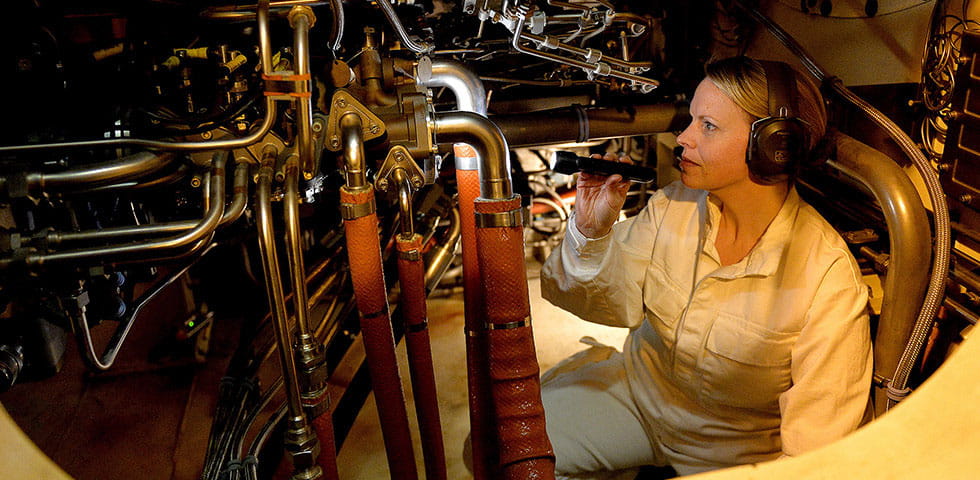Marine Engineer Officer
You’ll lead the day-to-day maintenance of our cutting-edge kit. Without you, vital operations couldn’t happen.
- £31,000 - £110,500
- Undergraduate Degree
- Surface Fleet
- Engineering
- Officer level
£31,000
£38,000
£27,000
Chartership
6 weeks
Travel

We run the team who run the ship, keeping her moving and fit for the challenge. It’s my role to manage the people who make that happen.
Role details
What you’ll do
Everyone looks to the Engineering Technicians to keep the ship moving. The Engineering Technicians look to you. Being a Marine Engineer Officer means leading the day-to-day maintenance of our most cutting-edge kit. Without you, vital operations wouldn’t happen. You’ll report directly to the Commanding Officer when there’s a problem, and be relied upon to make key decisions when it matters most.
Your role
- Lead and manage a team of specialist Engineering Technicians who will rely on your support, guidance, advice and understanding.
- Solve complex problems using the most sophisticated equipment on the planet. You might need to work alone, or rely on the expertise of your team.
- Keep our kit functioning correctly. You might be ensuring the hull, engines and power generation of the new Queen Elizabeth Class Aircraft Carrier are up to scratch. Or overseeing work on the water, cooling and hydraulics systems of a Type 45 Destroyer.
- Look after the welfare, morale, training and development of a team of skilled men and women, using your expertise to make decisions about complex engineering problems quickly while under pressure.
Pay & benefits
- A starting salary of over £31,000, rising to around £38,000 after just two years.
- An excellent non-contributory pension scheme – we pay into it for you, so you don’t have to sacrifice any salary.
- A £27,000 joining bonus.
- Six weeks of paid holiday every year
- Additional pay for each day spent at sea.
- Amazing opportunities, including world travel and adventurous training for two weeks every year.
- Forces Help to Buy scheme – a 0% loan to get you on, or further up, the housing ladder.
- Subsidised travel, accommodation and food.
- Handy discounts with lots of top brands, from Marriott hotels to Audi cars and high street stores.
Skills for life
Qualifications you'll gain
- Become an internationally recognised Chartered Engineer – we’ll support your professional registration.
Opportunities open to you
- Take advantage of opportunities for post graduate study, and work towards qualifications like the MSc in Marine Engineering, Electrical Engineering, Programme and Project Management.
Skills you'll develop
- Learn how to lead and manage people in a highly pressurised environment as part of the management team.
- Gain an in-depth knowledge of gas turbines, diesel generators, hydraulics and air systems.
- Get support and training to hone your management and leadership skills.
Eligibility
- You’ll need to be aged 18 to 39
- All Science, Technology, Engineering and Mathematics (STEM) degrees with be considered
- You’ll need a minimum of 96 UCAS points (or Scottish equivalent). At least 64 points should be in maths and an engineering-based science. These can be accrued from either GCE A/AS levels
- (or equivalent) or National Diplomas (e.g., BTEC).
- You’ll need at least 5 GCSEs at grades A*-C (9-4) (or Scottish equivalent), which must include English language and Mathematics
- You must be a United Kingdom national, or Commonwealth citizen, or Dual National. Dual Nationality restrictions do apply
- A Body Mass Index (BMI) between 18 and 28 (between 17 and 27 if under 18)
Skills & Interests
- An ability to thrive on responsibility and lead from the front
- Confidence making key decisions in high-pressure situations
- A passion for cutting-edge engineering
- An aptitude for solving problems
Joining Process
From picking your role to the first day of training; everything you need to know as an officer
Submit an application
Defence Aptitude Assessment (DAA)
You’ll be tested on: Verbal Reasoning, Numerical Reasoning, Work Rate, Spatial Reasoning, Electrical Comprehension and Mechanical Comprehension.
To prepare, you can practise the DAA
Interview
Medical and eye tests
Pre-Joining Fitness Test (PJFT)
This involves completing a 2.4km run on a treadmill within a certain time, at a fitness centre near you
Interview
Admiralty Interview Board (AIB)
This stage is unique to officers and takes place in two parts. A Pre Recorded Interview (PRI) is an online assessment which assesses your motivation to join the Royal Navy as an officer and your awareness of the Royal Navy. The Group Planning Exercise (GPE) is the second stage of the AIB and is an online competency based assessment which will take place on a separate day to the PRI. It will be conducted in a virtual group environment and you will be assessed on your contribution to the team based on your individual performance
Career Progression
Got a question?
Our virtual recruiter is available to answer your questions 24 hours a day
